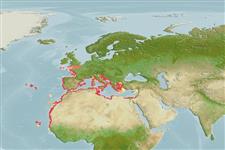Common names from other countries
>
Eupercaria/misc (Various families in series Eupercaria) >
Moronidae (Temperate basses)
Etymology: Dicentrarchus: Greek, di = two + Greek, kentron = sting + Greek, archos = anus (Ref. 45335).
More on author: Bloch.
Environment: milieu / climate zone / depth range / distribution range
Ekologi
marina; brackvatten; djupintervall 30 - ? m (Ref. 5990). Subtropical; 51°N - 10°N
Eastern Atlantic: English Channel (occasional) southward along the coasts of Europe and Morocco to Senegal and the Canary Islands; also southern Mediterranean and the Gulf of Suez.
Size / Vikt / Age
Maturity: Lm ? range ? - ? cm
Max length : 70.0 cm TL hane/ej könsbestämd; (Ref. 57391); common length : 30.0 cm TL hane/ej könsbestämd; (Ref. 3397)
Short description
Morfologi | Morfometri
Taggstrålar i ryggfenan (totalt): 9 - 10; Mjukstrålar i ryggfenan (totalt): 12-14; Taggstrålar i analfenan 3; Mjukstrålar i analfenan: 10 - 12. Diagnosis: elongate fish with 2 separate dorsal fins and a rather deep caudal peduncle; vomerine teeth patch anchor-shaped, with the posterior teeth extending to the midline of palate; scales on interorbital space ctenoid; opercle with 2 flat spines; lower preopercular margin with large, forward-pointing spines; caudal fin moderately forked; scales small (Ref. 57391).
Coloration: silvery grey, back bluish in life; juveniles and adults with small dark markings scattered over back and sides; a very distinct black spot on opercle (Ref. 57391).
Coastal species (Ref. 4197), found in coastal marine and brackish waters (Ref. 57391). Occurs on various kinds of bottoms, including sand, muddy sand and rocks; occasionally occurring in rivers (Ref. 6916, 57391). Also capable of living in hypersaline habitats (Sine Saloum in Senegal)(Ref. 57391). Feeds mainly on shrimps and mollusks, also fishes (Ref. 5990).
Life cycle and mating behavior
Könsmognad | Reproduktion | Lek | Ägg | Fecundity | Larver
Smith, C.L., 1990. Moronidae. p. 692-694. In J.C. Quero, J.C. Hureau, C. Karrer, A. Post and L. Saldanha (eds.) Check-list of the fishes of the eastern tropical Atlantic (CLOFETA). JNICT, Lisbon; SEI, Paris; and UNESCO, Paris. Vol. 2. (Ref. 6916)
IUCN Red List Status (Ref. 130435)
CITES (Ref. 128078)
Not Evaluated
Threat to humans
Harmless
Human uses
Fiskeri: mindre kommeriell; sportfisk: ja
Ytterligare information
referenserVattenbrukVattenbruksprofilAvelslinjerGenetikElectrophoresesÄrftlighetSjukdomarBehandlingMass conversion
MedarbetareBilderStamps, Coins Misc.LjudCiguateraHastighetSimsättGälytaOtolithsHjärnstorlekSyn
Verktyg
Special reports
Download XML
Internet-källor
Estimates based on models
Preferred temperature (Ref.
115969): 13.3 - 20.7, mean 17.3 (based on 39 cells).
Phylogenetic diversity index (Ref.
82804): PD
50 = 0.7656 [Uniqueness, from 0.5 = low to 2.0 = high].
Bayesian length-weight: a=0.00676 (0.00429 - 0.01066), b=3.06 (2.92 - 3.20), in cm Total Length, based on LWR estimates for this species & (Sub)family-body (Ref.
93245).
Trofisk nivå (Ref.
69278): 3.9 ±0.65 se; based on food items.
Resiliens (Ref.
120179): Mellan, lägsta populationsfördubblingstid 1,4-4,4 år (K=0.07-0.16).
Fishing Vulnerability (Ref.
59153): High vulnerability (55 of 100).
Climate Vulnerability (Ref.
125649): High to very high vulnerability (74 of 100).
